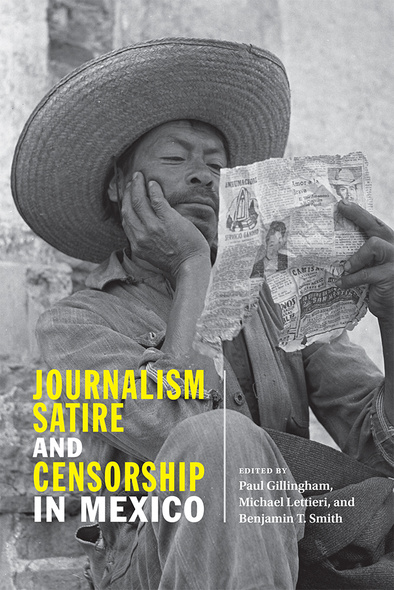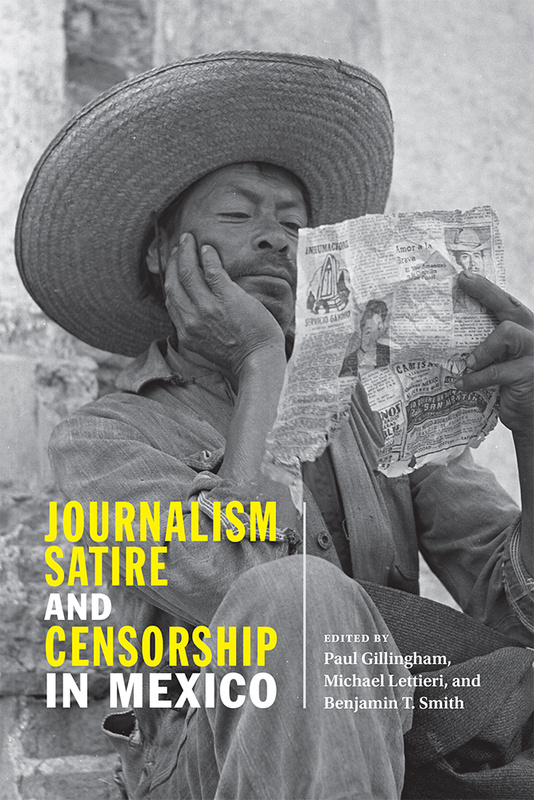
Journalism, Satire, and Censorship in Mexico
Since the 2000 elections toppled the PRI, over 150 Mexican journalists have been murdered. Failed assassinations and threats have silenced thousands more. Such high levels of violence and corruption question one of the fundamental assumptions of modern societies, that democracy and press freedom are inextricably intertwined. In this collection historians, media experts, political scientists, cartoonists, and journalists reconsider censorship, state-press relations, news coverage, and readership to retell the history of Mexico’s press.
Beyond offering a new historical perspective, the confluence of distinct views, knowledges, and focuses that make up Journalism, Satire, and Censorship in Mexico enables us to understand how the complex century-old relationship between media and power has evolved.
Considered together, the collection broadens our understanding of the complex nature of the Mexican print media and does important work in expanding the story beyond Mexico City and the typical subset of publications that have attracted the most attention. It contains much material that will be of use to historians of Mexico’s twentieth century, especially as it works to embed analysis of journalism in a discussion of broader and ever-shifting networks of power.
Journalism, Satire, and Censorship in Mexico provides a nuanced portrait of the uneven and contingent political and economic processes that shaped the press under the PRI’s dictablanda.
We journalists are not in the business of staying silent. For us, silence is not an option. But for those who abuse their power, censorship has always been a tool at their disposal. Well, this indispensable book shows us that, at the end, every story will be told (even the story of censorship).
Paul Gillingham is an associate professor of Latin American history at Northwestern University. He is the author of Cuauhtémoc’s Bones: Forging National Identity in Modern Mexico (UNM Press). Michael Lettieri is a senior research fellow at the Council on Hemispheric Affairs. Benjamin T. Smith is a reader in Latin American history at the University of Warwick. He is the author of Pistoleros and Popular Movements: The Politics of State Formation in Postrevolutionary Oaxaca.
List of Illustrations
Foreword. Killing the Messenger: The Perils of Committing Journalism
Judith Matloff
Acknowledgments
Introduction. Journalism, Satire, and Censorship in Mexico
Paul Gillingham, Michael Lettieri, and Benjamin T. Smith
Chapter One. Notes for a History of the Press in Mexico
Pablo Piccato
Chapter Two. Journalists on Trial: The Press, Censorship, and the Law, 1898-1920
Ana María Serna Rodríguez
Chapter Three. Changing Opinions in La Opinión: Maximino Ávila Camacho and the Puebla Press, 1936-1941
Andrew Paxman
Chapter Four. The Year Mexico Stopped Laughing: The Crowd, Satire, and Censorship in Mexico City
Benjamin T. Smith
Chapter Five. In the Service of the Gremio: Bus Industry Magazines, PRI Corporatism, and the Politics of Trade Publications
Michael Lettieri
Chapter Six. The Regional Press Boom, c. 1945-1965: How Much News Was Fit to Print?
Paul Gillingham
Chapter Seven. "The Invisible Tyranny"; or, The Origin of the "Perfect Dictatorship"
Jacinto Rodríguez Munguía
Chapter Eight. The Cartoons of Abel Quezada
Roderic Ai Camp
Chapter Nine. Testing the Limits of Censorship? Política Magazine and the "Perfect Dictatorship," 1960-1967
Renata Keller
Chapter Ten. Censorship in the Headlines: National News and the Contradictions of Mexico City’s Press Opening in the 1970s
Vanessa Freije
Chapter Eleven. Democratization and the Regional Press
Javier Garza Ramos
Chapter Twelve. Between the Imperius Curse and The Matrix: Attacks on Journalists in Mexico
Rafael Barajas
Chapter Thirteen. The Plaza Is for the Populacho, the Desert Is for Deep-Sea Fish: Lessons from la Nota Roja
Everard Meade
Chapter Fourteen. Front Lines and Back Channels: The Fractal Publics of El Blog del Narco
Paul K. Eiss
Bibliography
Contributors
Index




